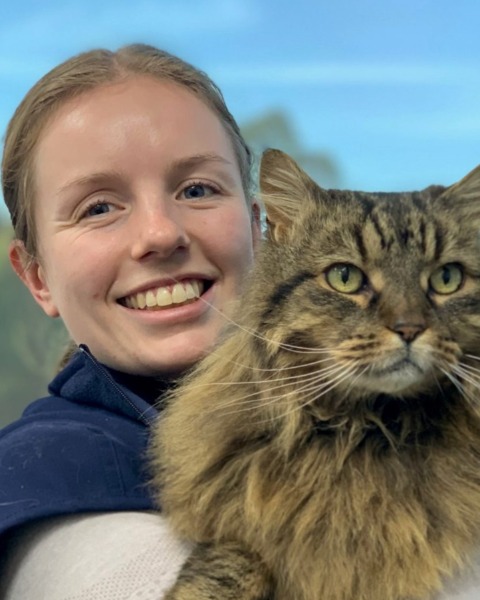Small Animal Internal Medicine
In Person Only
ID02 - Nucleoside Analogue EIDD-1931 in the Treatment of Naturally Occurring Feline Infectious Peritonitis
Thursday, June 6, 2024
10:15am - 10:30am CT
Location: MCC 103 A
CE: 0.25

Alex Kennedy, BVSc MANZCVS (she/her/hers)
Resident in Internal Medicine
Small Animal Specialist Hospital
NORTH RYDE, New South Wales, Australia
Research Abstract - Oral Presenter(s)
Abstract:
Background: Current antiviral therapy for feline infectious peritonitis (FIP) has limited availability and can be cost prohibitive. The nucleoside analogue EIDD-1931 is an effective inhibitor against feline infectious peritonitis virus (FIPV) serotype I & II in vitro. Hypothesis: EIDD-1931 is an effective treatment option for cats with naturally occurring FIP.Animals: Nine client-owned cats diagnosed with effusive or non-effusive FIP including neurological involvement.
Methods: Prospective clinical trial. Cats were administered EIDD-1931 orally twice daily for 12 weeks. A complete response was defined as resolution of all abnormalities associated with FIP. Clinical variables, hematology, biochemistry, and imaging findings were monitored during treatment and after discontinuing treatment.
Results: Six cats with effusive FIP and three cats with non-effusive FIP (median age 1.0 years, range 0.5-7.9) were treated with EIDD-1931 (median dose 18.75mg/kg PO q12, range 12.0-23.8) for 12 weeks in eight cats and 14 weeks in one cat. All cats showed a complete response to treatment. Adverse effects included transient neutropenia (three cats), elevated alanine transaminase (transient in three, persistent in one cat), broken whiskers (one cat) and suspected treatment induced relative hyporexia (six cats). Adverse effects were not dose dependent. Follow up was available for 91-231 days post treatment discontinuation. Relapse in one cat, 70 days after EIDD-1931 was discontinued, responded to repeat treatment (25mg/kg twice daily). Conclusions and Clinical importance: EIDD-1931 administered at 15-20mg/kg PO q12 for 12 weeks is a feasible treatment option for naturally occurring FIP. Adverse effects may be more common than treatment with GS-441524.
Background: Current antiviral therapy for feline infectious peritonitis (FIP) has limited availability and can be cost prohibitive. The nucleoside analogue EIDD-1931 is an effective inhibitor against feline infectious peritonitis virus (FIPV) serotype I & II in vitro. Hypothesis: EIDD-1931 is an effective treatment option for cats with naturally occurring FIP.Animals: Nine client-owned cats diagnosed with effusive or non-effusive FIP including neurological involvement.
Methods: Prospective clinical trial. Cats were administered EIDD-1931 orally twice daily for 12 weeks. A complete response was defined as resolution of all abnormalities associated with FIP. Clinical variables, hematology, biochemistry, and imaging findings were monitored during treatment and after discontinuing treatment.
Results: Six cats with effusive FIP and three cats with non-effusive FIP (median age 1.0 years, range 0.5-7.9) were treated with EIDD-1931 (median dose 18.75mg/kg PO q12, range 12.0-23.8) for 12 weeks in eight cats and 14 weeks in one cat. All cats showed a complete response to treatment. Adverse effects included transient neutropenia (three cats), elevated alanine transaminase (transient in three, persistent in one cat), broken whiskers (one cat) and suspected treatment induced relative hyporexia (six cats). Adverse effects were not dose dependent. Follow up was available for 91-231 days post treatment discontinuation. Relapse in one cat, 70 days after EIDD-1931 was discontinued, responded to repeat treatment (25mg/kg twice daily). Conclusions and Clinical importance: EIDD-1931 administered at 15-20mg/kg PO q12 for 12 weeks is a feasible treatment option for naturally occurring FIP. Adverse effects may be more common than treatment with GS-441524.


